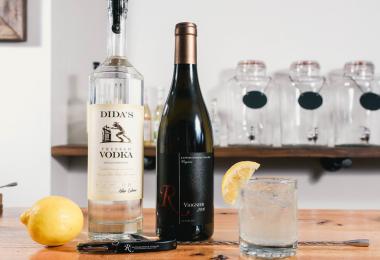Amid the chaos of the past five months, there are some things that have become clear about the UK wine market: the obvious, instant and severe impact from the enforced closure of the on-trade; the spike in sales through retail and online; the worry that the economic effects of the Covid-19 pandemic will cause a deep and prolonged recession that will damage the market still further.
The UK Covid-19 Impact Report from Wine Intelligence, published in May and the result of an online survey in the first half of April, confirms that general analysis. But it adds some extra layers of detail and insight about consumer behaviour during lockdown — and what might happen as restrictions are slowly lifted.
Drinkers drank more
As in the US, UK wine drinkers increased consumption during the early weeks of lockdown, but not all of them: Millennials (25-39) and Gen-X (40-54) did, but older and younger consumers reduced their intake. In the case of Gen-Z (18-24) consumers, suggests Wine Intelligence CEO Lulie Halstead, it’s because many of them moved back into the parental home, curtailing wine consumption opportunities in the on-premise among their social groups.
There’s a qualification to that consumption rise too: those who increased their wine intake were medium- or high-involvement wine consumers, not newcomers. “Those who have engaged even more with wine have been those who are already with us, and it’s not been the moment to bring new drinkers into the category,” says Halstead.
As consumers navigated this radically different lockdown landscape, wine suppliers and retailers were having to do the same. As restaurants and bars contemplated months of zero sales, specialist on-trade distributors and wholesalers, in particular, were left to rethink their entire business models.
The loss of the on-trade
For Berkmann Wine Cellars, that meant “the greatest ever test of the company’s mettle”, says purchasing director Alex Hunt MW. That encompassed the convening of a crisis committee in early March — before the lockdown was enforced — and the drawing up of a multi-faceted action plan. It covered everything from home working and no-contact deliveries to the stabilisation of the company’s finances to ensure continued operations.
On 3 April, Berkmann launched Help 4 Hospitality, a direct-to-consumer online pop-up wine shop that, by mid-July, had shifted £200,000-worth of wine to more than 1,000 people — and has aleady raised more than £70,000 for hospitality businesses and charities.
For Liberty Wines, communication with stakeholders was key. “We have spent the past few months in constant dialogue with our customers,” says managing director David Gleave MW. “For our independent retail customers, this included a big focus on premium wines and on finding ways to use our infrastructure to help them cope with increased demand.” He says they worked with hospitality businesses to collect stock, manage debt, devise reopening plans and keep their staff engaged during the lockdown through online winemaker masterclasses and education modules. “This approach meant we sold the same amount of wine in June this year as we did last year.”
Fine wine merchant Armit Wines is another business greatly reliant on restaurants and bars as a revenue source. “Our on-trade exposure obviously impacted our trading results, but equally we had an increase in other channels — both in off-trade and on our website,” reports managing director Brett Fleming. “As the time went on, we have held a large number of Instagram tastings, webinars and social media events with our suppliers, and these have proven to be key to keeping engaged with many people in the trade in all channels.”
Fleming is now keen to help on-trade customers plan ahead for the much talked-about “new normal” for the on-premise. “We have a few initiatives planned to support the reopening of accounts,” he says. “Much depends on the venues’ own objectives, but cash, stock and restart-up costs will dominate their efforts to navigate their way through to serving clients. If we can find ways to support this, we will.”
Armit has also signed a deal to become the first wine merchant supporter of educational body The Court of Master Sommeliers, supplying wine for courses and dinners, facilitating educational visits to supplier wineries, and providing competition prizes — part of the company’s “long-term” commitment to the on-trade, says Fleming.
But just how easy will it be for the on-trade to recover from the effects of the pandemic? Wine Intelligence’s survey suggests that consumers are — or, at least, were in April — highly reluctant to return to crowded spaces, whether restaurants, bars, outdoor events or transportation hubs.
So far, says Gleave, speaking in mid-July, results reported from restaurants have been “quite mixed”. He adds: “The venues that have opened so far — many have postponed opening until later in July or August or, in some cases, September — are working on lower levels of stock. They are ordering while also selling through what is in their cellar. We’re seeing sales growing, but they are growing slowly, as expected.”
Hunt is cautiously optimistic. “So far, July is tracking comfortably ahead of our forecast, but we are not counting any chickens just yet,” he says. “The trade is only just beginning to reawaken; many risks and pitfalls lie ahead.”
Nobody, it is clear, is predicting a bonanza of new orders from restaurants. Fleming expects them to focus on liquidating current inventories instead first. “This will result in a delayed replenishment through the supply chain,” he says. “This will place further pressure on most distributors as a result but, frankly, it is just too difficult to truly predict how this will all play out.”
How did retailers do?
As the on-trade suffered, retailers were supposedly cashing in. But life was complicated for them too. “On 21 March, we effectively turned our entire 200-store estate into delivery hubs overnight, when we took the decision to close our doors to walk-in customers and instead offer home delivery through our own van fleet — and completed record numbers of home deliveries,” says Majestic’s CEO John Colley. “We’ve now adapted to the ‘new normal’, with our stores all open with social distancing measures, extra hygiene precautions and protective equipment.”
Conventional wisdom has it that consumers revert to the familiar at times of crisis, but that wasn’t the Majestic experience. “What’s been most encouraging to us is that we’ve added about 250 new lines over the past few months to Majestic stores — and we’re seeing these new wines make up 20 percent of customer baskets,” says Colley. “That’s pretty remarkable as we’ve only just reopened the stores for walk-in browsing, which is normally how customers discover something new.”
What of the future? Will the spike in online wine purchases continue? Consumer behavioural psychology suggests that people are only too happy to revert to old habits when the crisis passes, says Halstead, but rising online sales were a fact of the market before Covid-19 hit.
“There will naturally be some drop-off as people leave lockdown, but now that many consumers have made the move to buying wine online, it is hard to imagine them stopping,” says Gleave.
For Colley, the pandemic only reinforces the need for anyone selling wine to the UK public to adopt a multi-channel approach. “As we come out of lockdown, we’re seeing customers who have discovered us as an online retailer over the past couple of months now visiting our stores,” he says. “If anything, this has given us more confidence in the role of our bricks-and-mortar arm. We think that the future will not be about one channel or the other, but instead having the best possible service across all channels for our customers to experience and discover.”








